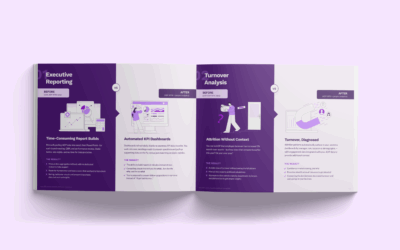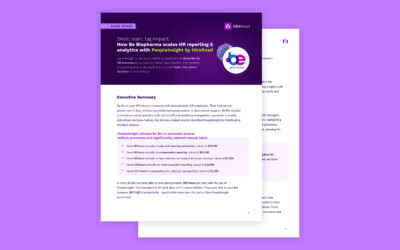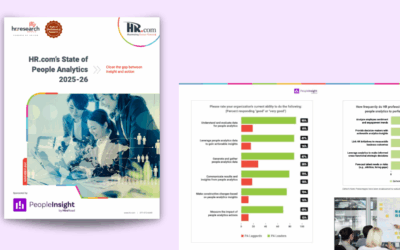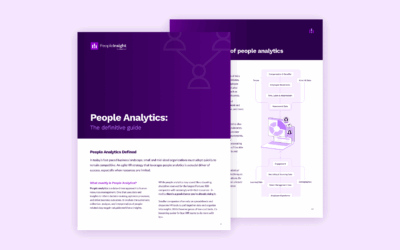Our Resources
Featured
by Katie Brown | Nov 12, 2025 | Featured, Webinars | 0 Comments
Discover how you can turn your existing ADP Workforce Now® data into dynamic, connected insights that drive action.
by Hannah Mangum | Oct 30, 2025 | Ebooks & Reports, Featured | 0 Comments
Discover how you can turn your existing ADP Workforce Now® data into dynamic, connected insights that drive action.
by Hannah Mangum | May 13, 2025 | Featured, Webinars | 0 Comments
Learn a better way to get more from your Workday data through the power of people analytics—without the added cost, complexity, or need for internal data experts.
by Hannah Mangum | Oct 6, 2025 | Featured, News | 0 Comments
ClickUp has been honored with a Bronze award in the 2025 Brandon Hall Excellence Award in Talent Forecasting for Strategic Use of PeopleInsight by HireRoad!
by Katie Brown | Aug 19, 2025 | Featured, News | 0 Comments
PeopleInsight by HireRoad introduces PeopleInsight Essentials—an AI-driven HR analytics platform built for lean HR and TA teams. Starting at $250/week, it delivers dashboards, executive-ready reports, and predictive insights in just 5 days—no IT or long contracts required.
by Hannah Mangum | Jul 23, 2025 | Featured, News | 0 Comments
PeopleInsight by HireRoad named Silver winner in 10th annual Stevie® Awards for Great Employers in the category of HR Technology Solution Provider of the Year.
by Hannah Mangum | Apr 18, 2025 | Featured, News | 0 Comments
Lighthouse Research & Advisory has named people analytics leader PeopleInsight by HireRoad a winner in the 2025 HR Tech Awards program.
by Hannah Mangum | Jan 16, 2025 | Ebooks & Reports, Featured | 0 Comments
This exclusive ebook explores the key trends and challenges of 2025, and shares opportunities and best practices to help organizations launch a successful people analytics function.
by Hannah Mangum | Oct 30, 2025 | Case Studies, Featured | 0 Comments
A look at how a 3-person HR team went from static ADP reports to advanced insights and automated reporting in a matter of months
Case Studies
by Katie Brown | May 23, 2025 | Case Studies | 0 Comments
Discover how Intercom improved its people analytics capabilities to enable strategic decision-making.
by Hannah Mangum | Oct 30, 2025 | Case Studies, Featured | 0 Comments
A look at how a 3-person HR team went from static ADP reports to advanced insights and automated reporting in a matter of months
by Hannah Mangum | Dec 13, 2024 | Case Studies | 0 Comments
Discover how Be Biopharma used PeopleInsight by HireRoad to save approximately 382 hours and $47,000 of productivity costs per year.
by Katie Brown | Mar 25, 2025 | Case Studies, Featured | 0 Comments
Explore how JOEY Restaurants utilizes data-driven strategies to improve hiring and enhance leadership development across locations.
by Selena Shinnan | Dec 3, 2024 | Case Studies | 0 Comments
Discover how goeasy used PeopleInsight by HireRoad to cut turnover by 23%, enhance productivity, and transform HR into a data-driven powerhouse.
by Nightshift | Feb 28, 2023 | Case Studies | 0 Comments
Let’s look at one of our healthcare clients and how they benefit from people analytics. This client delivers patient care in hospitals and residences, conducts...
by Nightshift | Feb 28, 2023 | Case Studies | 0 Comments
We talked with Chris Gruttadauria, VP of HR at Alliance HealthCare Services. Chris is a pioneer and has been on the path with people data analytics for over 5 years. He...
by Nightshift | Feb 28, 2023 | Case Studies | 0 Comments
CBRE: An HR Analytics Case Study We chatted with Méline Van Slyke, Director of Human Resources at CBRE Limited, the Canadian arm of the world’s largest commercial real...
by Selena Shinnan | Feb 8, 2022 | Case Studies | 0 Comments
Managing individual school recruitment centrally Nova Education Trust is a primary and secondary Academy Trust located in Bingham, Nottinghamshire. The Trust currently...
Ebooks & Reports
by Hannah Mangum | Oct 30, 2025 | Ebooks & Reports, Featured | 0 Comments
Discover how you can turn your existing ADP Workforce Now® data into dynamic, connected insights that drive action.
by Katie Brown | Dec 2, 2025 | Ebooks & Reports | 0 Comments
Uncover the latest trends, challenges, and insights from HR leaders across industries, all aimed at helping organizations harness the power of people analytics to drive better business outcomes.
by Katie Brown | Nov 18, 2025 | Ebooks & Reports | 0 Comments
Discover how leading organizations prove the ROI of HR investments with people analytics. Learn the metrics executives care about, real-world use cases, and a practical framework to align HR with CEO and CFO priorities. Download the free Aptitude Research report today.
by Hannah Mangum | Jul 23, 2025 | Ebooks & Reports | 0 Comments
Discover how leading organizations prove the ROI of HR investments with people analytics. Learn the metrics executives care about, real-world use cases, and a practical framework to align HR with CEO and CFO priorities. Download the free Aptitude Research report today.
by Katie Brown | Jul 14, 2025 | Ebooks & Reports | 0 Comments
This exclusive ebook outlines how organizations of all sizes can elevate their people strategy and, ultimately, their overall performance.
by Katie Brown | Jul 14, 2025 | Ebooks & Reports | 0 Comments
This exclusive ebook outlines how organizations of all sizes can elevate their people strategy and, ultimately, their overall performance.
by Katie Brown | May 23, 2025 | Ebooks & Reports | 0 Comments
This exclusive ebook outlines how organizations of all sizes can elevate their people strategy and, ultimately, their overall performance.
by Hannah Mangum | Jan 16, 2025 | Ebooks & Reports, Featured | 0 Comments
This exclusive ebook explores the key trends and challenges of 2025, and shares opportunities and best practices to help organizations launch a successful people analytics function.
by Hannah Mangum | Oct 8, 2024 | Ebooks & Reports | 0 Comments
Get more out of your Workday data and provide your organization with a single source of truth for your people data.
Webinars
by Katie Brown | Nov 12, 2025 | Featured, Webinars | 0 Comments
Discover how you can turn your existing ADP Workforce Now® data into dynamic, connected insights that drive action.
by Hannah Mangum | May 13, 2025 | Featured, Webinars | 0 Comments
Learn a better way to get more from your Workday data through the power of people analytics—without the added cost, complexity, or need for internal data experts.
by Katie Brown | Mar 17, 2025 | Featured, Webinars | 0 Comments
On-Demand Webinar:Transform your ATS data into powerful insights.The world of talent acquisition is more data-driven than ever. Yet, even with an award-winning ATS like...
by Hannah Mangum | Oct 2, 2024 | Webinars | 0 Comments
On-Demand Webinar:GoEasy's Journey to Data-Driven HR ExcellenceDiscover how GoEasy revolutionized their HR practices through strategic people analytics, facilitated by...
by Selena Shinnan | Nov 1, 2024 | Webinars | 0 Comments
Discover actionable strategies for early-career analysts to senior HR leaders, explore best practices for implementing people analytics across different organization sizes, and learn how to balance in-house resources with external solutions in this insightful webinar.
by Selena Shinnan | Oct 10, 2024 | Webinars | 0 Comments
Pulling from real-world use cases, see how companies build DEI strategies with people analytics. This webinar will guide HR and DEI leaders on the journey from data collection to impactful action, in an era of DEI pushback.
by Selena Shinnan | Sep 11, 2024 | Uncategorized, Webinars | 0 Comments
Webinar:Showcase Recruitment Effectiveness through Data StorytellingDemonstrate the impact of your recruiting strategy using the power of people analytics and...
by Nightshift | Mar 1, 2024 | Webinars | 0 Comments
Webinar: The Future of People Analytics: Learnings from Aptitude ResearchWant to get the latest insights on the state of people analytics and what it means for your...
by Selena Shinnan | Nov 28, 2023 | Webinars | 0 Comments
Watch Panel Webinar!Don’t miss this engaging panel discussion (webinar) on the increasingly important value of people analytics! In this session, expert panelists...
Infographics
by Katie Brown | Dec 3, 2025 | Infographics | 0 Comments
Explore HR.com’s State of People Analytics 2025–2026. Learn what’s holding PA back, how leaders use AI, and download key benchmarks.
by Selena Shinnan | Nov 7, 2023 | Infographics | 0 Comments
Download InfographicData-driven HR involves the integration of people data with business outcomes data to make informed decisions that positively impact both...
by Selena Shinnan | Nov 7, 2023 | Infographics | 0 Comments
Get more out of your UKG DataWhile UKG and other transactional HR systems have their own reporting function, our customers found these systems didn’t provide the...
by Selena Shinnan | Oct 31, 2023 | Infographics | 0 Comments
What lies beneath the surface is keyAbove the surface we find foundational metrics and standard reporting. These metrics are important for HR to understand basic...
by Selena Shinnan | Oct 31, 2023 | Infographics | 0 Comments
Download the Infographic Employee engagement is critical to a thriving organisation and culture. Read about the 6 key steps to ensuring your business will deliver an...
by Selena Shinnan | Oct 31, 2023 | Infographics | 0 Comments
Download the HRBP Reporting and Analytics InfographicThis infographic dives into the essential traits of being an effective HR Business Partner (HRBP) and provides...
Videos
by Katie Brown | Oct 21, 2025 | Videos | 0 Comments
In part 4 of this 4-part series, Lydia Wu shares her final reflections after going live with PeopleInsight Essentials.
by Katie Brown | Oct 21, 2025 | Videos | 0 Comments
In part 3 of this 4-part series, Lydia Wu gets her first look at the suite of PeopleInsight Essentials dashboards bringing her data to life.
by Katie Brown | Oct 21, 2025 | Videos | 0 Comments
In part 2 of this 4-part series, Lydia Wu continues her deep dive into the PeopleInsight Essentials onboarding journey, focusing on the data handoff and dashboard creation process.
by Katie Brown | Oct 21, 2025 | Videos | 0 Comments
In part one of this 4-part series, Lydia will walk you through what the PeopleInsight Essentials onboarding process looks like. From the very first onboarding call to full deployment with her very own data.
by Hannah Mangum | Nov 7, 2024 | Videos | 0 Comments
Learn how Shane Noe, VP of People at ClickUp, went about launching people analytics initiatives from the ground up with the help of PeopleInsight.
by Selena Shinnan | Sep 11, 2024 | Videos | 0 Comments
ASK THE EXPERTS:What advice do you give to customers for personalizing their analytics?Hear from our in-house people analytics expert and Director of Professional...
by Hannah Mangum | May 29, 2024 | Videos | 0 Comments
Elevate your HR Impact with PeopleInsight by HireRoad PeopleInsight seamlessly integrates with your HR systems to provide meaningful analytics visualizations,...
Blogs
by Katie Brown | Nov 25, 2025 | Blogs | 0 Comments
Exit interviews skew December resignations; pair them with pre-exit signals, manager changes, pay compression and mobility gaps. Act early with a simple plan.
by Katie Brown | Nov 25, 2025 | Blogs | 0 Comments
Cut boomerang hiring costs by preventing regret exits with targeted pay fixes, manager support, and a clear policy. Publish a simple rehire-vs-retain ROI.
by Katie Brown | Nov 25, 2025 | Blogs | 0 Comments
Stop December resignations from blind siding you. Build a 10-day risk radar to spot year-end attrition, keep talent, and reduce backfill churn – see the demo.
by Katie Brown | Oct 29, 2025 | Blogs | 0 Comments
Get on-demand answers to headcount, attrition, diversity, skills, and ROI with HR analytics—unify data and automate refreshes. See the playbook to move faster.
by Katie Brown | Oct 24, 2025 | Blogs | 0 Comments
Unify BambooHR with ATS, payroll, and finance to get trusted people analytics—without a BI build. See dashboards for hiring, retention, pay equity, and more.
by Katie Brown | Oct 24, 2025 | Blogs | 0 Comments
Slow reporting is a silent tax. See how to centralize data, automate pipelines, enable self-service, and publish fast to cut BI latency and act on timely data.
by Hannah Mangum | Oct 9, 2025 | Blogs | 0 Comments
See how PeopleInsight unifies ADP Workforce Now® with your HR tech stack to turn payroll, time, and TA data into executive-ready insights.
by Hannah Mangum | Sep 17, 2025 | Blogs | 0 Comments
Unseen flight risks drain budgets through turnover, lost productivity, and morale dips. Learn how to surface at-risk employees early and protect talent.
by Hannah Mangum | Sep 17, 2025 | Blogs | 0 Comments
Spot early indicators of employee turnover and act before resignations happen. Predictive insights and stay interviews help you improve retention.




















































